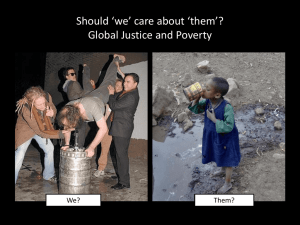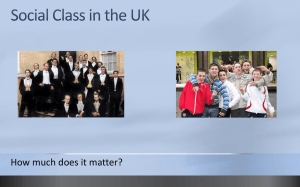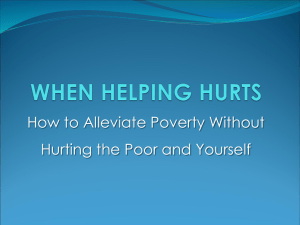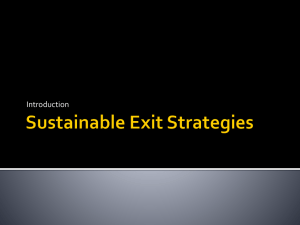When Helping Hurts
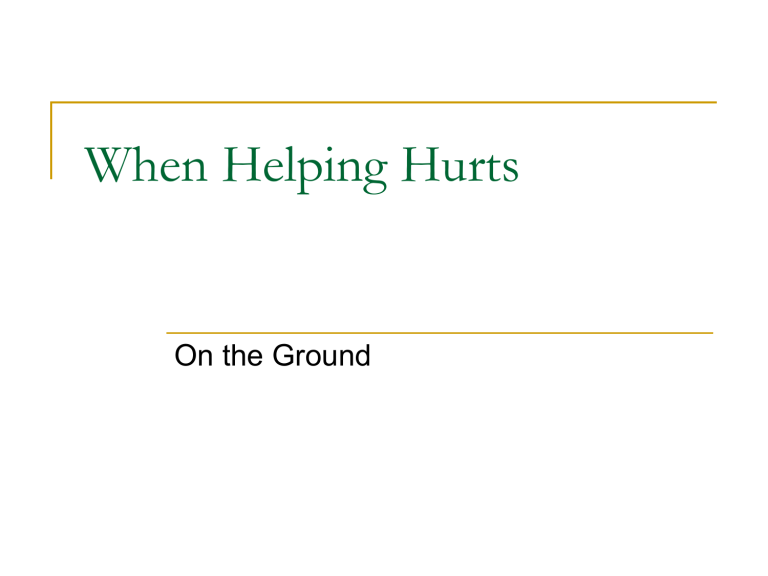
When Helping Hurts
On the Ground
When Helping Hurts – Welcome!
Text – When Helping Hurts – Corbett & Fikkert
Goal #1 – Understanding the Poor
Goal #2 – Better how to help effectively
Goal #3 – Compassionate Realism
Why Understand?
People of means can sometimes despise people less fortunate
People of means can sometimes indulge people less fortunate
People of means often simply cannot understand how anyone could be poor in America
There are lots of misconceptions out there.
Why Learn to Help?
People of means don’t always know what people really need.
People of means can hurt more than help and not know it
People of means can be used by the less fortunate in pursuit of wrong goals
Intended Audience
Evangelical Christians who are people of means:
Who live in communities of means
Who attend churches of means
For whom poverty just does not make sense.
But who want to make a difference in a way that really helps and not hurts like so many poverty alleviation approaches & programs
Compassion with Realism?
Blind Side
Helped – Michael Oher
Helpers – The Tuohy’s
(Leigh Anne)
Place – Home and
Briarcrest Christian
School
Action – adoption, tutors, advocacy
Results – graduation, college & pro football
Blind Sided
Helped – Michael Burrell
Helpers – The
O’Connors, Jones,
Groffs, Mortons
Place – Home, WPC,
WSM, McCaskey,
Oregon Dairy
Action – temp adoption, academic support, job, counseling
Results - Released
Plight of the Poor
Poor people typically talk in terms of shame, inferiority, powerlessness, humiliation, fear, hopelessness, depression, social isolation and voicelessness.
Middle and upper class North Americans tend to emphasize food, money, clean water, medicine, housing, jobs, etc.
pg 53
Plight of the Poor
“In addition, the seeming intractability of their situation, caused in large part by the lack of wellpaying jobs and the persistence of racial discrimination, has engendered deep-seated bitterness and anger in many of the most desperate and poorest blacks, especially the young people.”
( Elijah Anderson Code of the Street pg 46)
Plight of the Poor
However the underlying diseases behind those symptoms are not always very apparent and can differ from person to person. A trial and error process may be necessary before a proper diagnosis can be reached. Like all of us, poor people are not fully aware of all that is affecting their lives and like all of us, poor people are not always completely honest with themselves or with others. And even after a sound diagnosis is made, it may take years to help people overcome their problems. Pg 56
It may require spending yourself . “and if you spend yourselves in behalf of the hungry and satisfy the needs of the oppressed, then your light will rise in the darkness, and your night will become like the noonday.” – Isa 58:10
Four Foundational Relationships
Relationship with God – Glorify God and enjoy Him forever.
Relationship with Self – Created in the image of God giving worth and dignity
Relationship to Others – Created to dwell in loving relationships, fulfill callings
Relationship with Rest of Creation – Cultural
Mandate (subdue and steward)
God
Economic System
Self
Others
Religious System
Rest of
Creation
God
Economic System
Poverty of Spiritual
Intimacy
Self
Poverty of
Being
Others
Poverty of Community
Rest of
Creation
Poverty of
Stewardship
Religious System
Immediate Causation in the Book?
Society crams historically oppressed, uneducated, unemployed, and relatively young human beings into high-rise buildings , takes away their leaders, provides them with inferior education, health care and employment systems that pays them not to work?
(92)
Is it surprising that we see out of wedlock births, broken families, violent crimes, drugs and end up with nihilism? Broken systems do serious damage to people’s worldviews. (92)
Trying to help individualists see systemic causation.
Alisa Collins Before (75) – Missing?
Context (or culture) – Chicago Projects
Widespread drug abuse
Failing schools
High unemployment
Rampant violence
Teenage pregnancy
Role models absent
Personal Set-up
Pregnant
– 16 years old
Drop out of high school – by 16
Welfare Checks
By book time – 5 children by 3 different men, no support
Obstacles (made your bed sleep in it or victim in need of social redemption?)
Few Skills
No Husband
Limited social network
Can’t find or keep regular work
Lack of decent paying jobs for Drop outs
Welfare system deducts any funds earned (penalized)
Jobs/Vocational program bureaucrats
(condescending)
Inadequate child care
Emotions
Feelings of inferiority and inadequacy
(rather than shame)
Lacks confidence in job hunting or votech training
Feels trapped in the ghetto.
? Cultural Values Taught or Caught
Subsistence or Street Values
Habits passed down from social network.
The Line?
Personal
Responsibility
Able
?
Socially
Determined
Disable
Social Determinism – personal choices are causes by some antecedent force such that a person is not free to choose otherwise. Hence the choice is not right or wrong, for they do not have the power to do otherwise. The choice just is.
Poverty of Being 1 (Dignity/Pride)
“A major premise of this book is that until we embrace our mutual brokenness, our work with lowincome people is likely to do far more harm than good.
” - Pg 64-author Italics
The poor suffer from a sense in inferiority because the have failed materially. (inferiority complex) (64)
The rich suffer from a sense of superiority because they have succeeded materially (god-complex). (65)
Poverty of Being 1 (67)
Material
Definition of Poverty
+
God-complexes of Materially
Non-Poor
+
Feelings of
Inferiority of
Materially
Poor
=
Harm to Both
Materially
Poor and
Non-Poor
Poverty of Being 1 - Answers
1.
Mutual brokenness and respect
2.
Repent of health and wealth gospel
Poverty of Being 1
The brother in humble circumstances ought to take pride in his high position. But the one who is rich should take pride in his low position, because he will pass away like a wild flower. For the sun rises with scorching heat and withers the plant; its blossom falls and its beauty is destroyed. In the same way, the rich man will fade away even while he goes about his business. James 1:9-11
Poverty of Being 2 (Guilt/Blame)
Guilt – Subtle, unconscious sense of guilt that makes people feel apologetic about being civilized, educated, and productive when others are barbaric, uneducated, and parasitic. (Helpers)
Blame – Subtle, unconscious sense of resentment that makes people feel their poverty is caused by society, particularly the civilized, educated and non-poor.
(Helpees)
Poverty of Being 2 (Guilt/Blame)
The real hurt is when the actions of the survivor (subsistence) or the street (criminal) poor person perpetuate choices, lifestyles and habit patterns that are known to lead to various levels of poverty as a consequence.
Hence, while blaming others, we are less likely to make the fundamental changes in our own lives that could lift ourselves up from poverty.
Again, Answer to Helpers
Serve as one Among not as one Above.
Jesus never apologized for his divinity or his perfection or suggested that maybe humanity is better than divinity (Avatar).
But he shed his glory so that He could serve incarnationally.
Ministry
Avoid Dependency Preserve Dignity
Helper Helpee
Mutual Brokenness
See Beyond Faults
Trust God To
Hurts:
Inferiority
Enabling
Humility
Empowerment
Transparency
Vulnerability
Trust God Through
Helps:
Dignity
Empowerment
Participation (110)
Ensure participation of affected person or population from assessment to implementation.
Conduct application process
Respond to need if needs cannot be meant by local agents. (We are the local agents.)
Aid workers must be called and trained
(Deacons and Deaconesses)
Participation–International Scene
For aid to be effective, it must be linked to broad reforms aimed at building strong institutions, rule of law and sound government free of corruption. In short an
“enabling environment” for entrepreneurship.
- (Eberly 64, 72)
Other factors include “good harbors, close contact with the rich world, favorable climates, adequate energy sources, and freedom from epidemic disease.”
– Jeffrey Sach. (Eberly-70)
The West must acknowledge their role in excluding the poor from the world trading system through trade barriers and national subsidies. - (Eberly 72)
Participation (115)
Avoid Paternalism – Do not do things for people that they can do for themselves.
Types of Paternalism
Resource Paternalism – We got the Funds
Spiritual Paternalism - We got the Word
Knowledge Paternalism - We got the Know-How
Labor Paternalism - We got the Muscle
Managerial Paternalism We can git ‘er Done
Particularity of Resources
Jesus Christ came to the world through the Jews.
The Gospel came to the Gentiles through the Jews.
Japan came into the modern world through the
West.
Africa was re-evangelized through white missionaries.
Certain aspects of cultural capital came to black folks through white folks.
Cultural capital then comes to Shanana through
Condi
Particularity of Resources
Shanana asks:
Why I got to be like her?
Why must we learn from them?
The issue is:
1. God uses some to pass on to others what they need.
2. Takes what is commonly required to make life
(faith in OT & NT) but disregard what is culturally peculiar (circumcision for OT only).
Ministry
Ensure Participation Accept Particularity
Helper Helpee
Humility
Know much but not all
Servant whose received.
Know some, but needs more
Student to receive.





